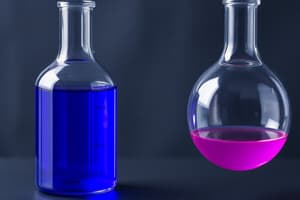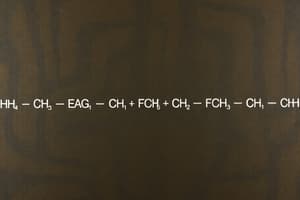Podcast
Questions and Answers
What is the primary purpose of an assay?
What is the primary purpose of an assay?
- To categorize natural and artificial materials into distinct groups
- To quantitatively measure or qualitatively assess a target entity (correct)
- To enhance the therapeutic effect of drugs
- To identify the aesthetic properties of substances
What characteristic distinguishes a chemical assay from a bioassay?
What characteristic distinguishes a chemical assay from a bioassay?
- Chemical assays require less manpower than bioassays.
- Chemical assays are exclusively used for quantifying biological activity.
- Bioassays are more cost-effective than chemical assays.
- Bioassays are less precise when measuring a drug's concentration. (correct)
In which situation would a bioassay be indicated over a chemical assay?
In which situation would a bioassay be indicated over a chemical assay?
- When active principles of the drug are unidentified (correct)
- When a chemical method is faster and simpler
- When measuring high dose pharmacological responses
- When the chemical composition of the drug is fully known
Which statement about bioassays is true?
Which statement about bioassays is true?
What is a common limitation of conducting a bioassay?
What is a common limitation of conducting a bioassay?
Which aspect is NOT covered by the principles of bioassay?
Which aspect is NOT covered by the principles of bioassay?
How does a chemical assay compare to a bioassay in terms of time management?
How does a chemical assay compare to a bioassay in terms of time management?
Which statement about immunoassays is accurate?
Which statement about immunoassays is accurate?
What is a characteristic of a quantal bioassay?
What is a characteristic of a quantal bioassay?
Which of the following is NOT a purpose of bioassays?
Which of the following is NOT a purpose of bioassays?
What is the main drawback of biological assays?
What is the main drawback of biological assays?
What does LD50 refer to in bioassays?
What does LD50 refer to in bioassays?
Which of these tests uses a rabbit as a test animal?
Which of these tests uses a rabbit as a test animal?
Which statement regarding accuracy limits of bioassays is accurate?
Which statement regarding accuracy limits of bioassays is accurate?
Graded bioassays produce effects that depend on which factor?
Graded bioassays produce effects that depend on which factor?
Which of the following substances would be tested using a rat in a biological assay?
Which of the following substances would be tested using a rat in a biological assay?
Flashcards are hidden until you start studying
Study Notes
Assay
- Investigative procedure used to measure or assess the presence, amount, or activity of a target entity called the analyte which could be a drug, biochemical substance, or organic sample.
Types of Assays
- Chemical Assay: Study of separation, identification, and quantification of chemical components in natural and artificial materials.
- Immunoassay: Uses the interaction between an antigen and its antibody to identify and quantify the specific antigen or antibody in a sample.
- Biological Assay: Testing procedure to estimate the concentration of a pharmaceutical drug in a formulated product or bulk material. The potency of the drug is compared with the standard by observing its effects on animals or human volunteers.
Comparison of Chemical & Bioassay
Chemical Assay
- More precise
- Less time-consuming
- Less expensive
- Active constituent & structure fully established
- Less sensitive
- Requires less manpower
- Easy to handle
Bioassay
- Less precise
- More time-consuming
- More expensive
- Active constituent & structure not known
- More sensitive
- Requires more manpower
- Difficult to handle
Indications of Bioassay
- When the chemical method is unavailable, too complex, or insensitive to low doses (e.g., histamine).
- When the active principle of a drug is unknown (e.g., insulin).
- When the chemical composition of a drug is unknown (e.g., long-acting thyroid stimulator).
- When the chemical composition of a drug is variable but it has the same pharmacological action (e.g., cardiac glycosides).
- When the active principle cannot be isolated (e.g., posterior pituitary extract, insulin).
- When the biological activity of a drug cannot be defined by a chemical assay (e.g., cis and trans forms of methylphenidate).
- When it's not possible to separate interfering substances (e.g., Vitamin D).
Principles of Bioassay
- All bioassays should be compared against a standard drug.
- The standard and new drug should be, as far as possible, identical to each other.
- The activity measured should be the activity of interest.
- The degree of pharmacological response produced should be reproducible under identical conditions (e.g., adrenaline).
- The method of comparison preferably (not essentially) tests the therapeutic property of the drug.
- Individual variations must be minimized.
Classification of Bioassay
- Quantal: All or none response in all individuals (e.g., digitalis-induced cardiac arrest in guinea pigs, hypoglycemic convulsions in mice by insulin). It's used to compare LD50 and ED50 and threshold response values.
- Graded: The effect is produced gradually depending on the dose (e.g., contraction of smooth muscle preparation).
Accuracy limits of bioassay
- An accuracy within 20% of the true value is considered good.
- An accuracy within 10% of the true value is considered excellent.
Dependency of biological testing procedure
- Biological assay depends on the size of the dose and potency of the drug.
- The effect produced in animals might not be the same as that produced in humans (exceptions exist).
Partial list of official quantitative biological tests
| Drug and Dosage Form | Test Animal(s) |
|---|---|
| Antibiotics | Suitable Microorganism |
| Insulin | Rabbit & Mice |
| Digitalis & other glycosides | Pigeon & Guinea Pig |
| Vitamin A & D | Rat |
| Parathyroid drugs | Dog |
| Posterior pituitary | Rat |
| Tubocurarine Chloride | Rabbit |
Purpose of Bioassay
- To compare a test sample with a standard substance to determine the quantity of the test required to produce an equivalent biological response.
- To measure the pharmacological activity of a new or chemically undefined substance.
- To test the response of living animals to the toxicity of chemical contaminants.
- To investigate the function of endogenous mediators (e.g., in the development of the inflammatory response).
- To determine the concentration and potency of an unknown substance.
- To improve and maintain standards of environmental conditions that affect people's wellbeing.
- To determine the specificity of a compound (e.g., penicillins' effectiveness against G+ve bacteria but not G-ve bacteria).
Preparation of standard
- A selective representative sample of a substance that serves as a basis for comparison.
Studying That Suits You
Use AI to generate personalized quizzes and flashcards to suit your learning preferences.




